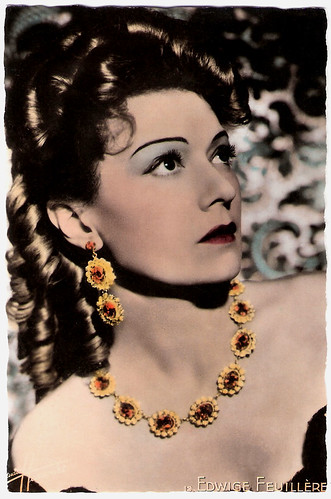
French postcard by Greff / S.E.R.P. Editeur, Paris, no. 596 A. Photo: Continental Films. Edwige Feuillère.
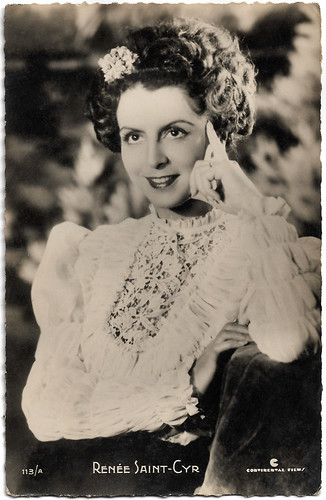
French postcard by Editions Continental, no. 113/A. Photo: Continental Films. Renée Saint-Cyr.

French postcard by Editions Continental, no. 118/A. Photo: Continental Films. Louis Jourdan.
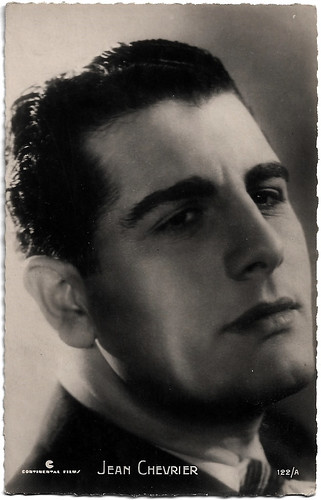
French postcard by Editions Continental, no. 122/A. Photo: Continental Films. Jean Chevrier.
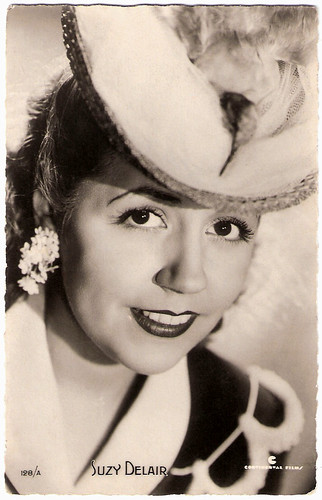
French postcard by Editions Continental, no. 128/A. Photo: Continental Films. Suzy Delair.

French postcard by Edit. Chantal, Rueil, no. 596 A. Photo: Continental Films. Edwige Feuillère.
Appointed by Joseph Goebbels
The order to found a German-controlled film production company in occupied France was given by Joseph Goebbels, the Minister of Propaganda of the Third Reich, in September 1940. For Goebbels, the purpose of this company was above all political, in order to keep control of film production in the occupied countries. Continental Films was established in October 1940. The Francophile Alfred Greven, who had been UFA's head of production for a short time in the spring of 1939 but was then replaced by Goebbels after only a few weeks, was appointed as director of this company.
Greven commandeered Paris studios and French screening facilities and in a short time brought the production activities of French rival companies to a virtual standstill. Goebbels wanted the Continental to produce simple, kitschy films. Alfred Greven, however, saw things differently. He was eager to promote the new company and signed on stars such as the actors Fernandel, Harry Baur, Edwige Feuillère, Pierre Fresnay, Raimu and Danielle Darrieux. Only a few directors, such as the highly respected Jean Renoir, preferred "to leave the German-occupied country as quickly as possible after Greven's offer of cooperation in order to avoid the smell of collaboration.
Continental had funds that were far greater than those of other studios at the time of the collaboration, which were facilitated by the use of excellent quality film (new and not recycled), and materials for sets and costumes that were practically impossible to find elsewhere. The Continental production included a number of high-quality productions by talented and subsequently important French directors such as Christian-Jaque, Henri-Georges Clouzot, Henri Decoin and André Cayatte. Continental's first production was L'Assassinat du père Noël/Who Killed Santa Claus? (Christian-Jaque, 1941) with Harry Baur and Raymond Rouleau. The firm gave Henri-Georges Clouzot his first directoral job for the comic thriller L'Assassin habite au 21/The Murderer Lives at Number 21 (Henri-Georges Clouzot, 1942), which Clouzot also co-wrote.
Well-positioned with French filmmakers willing to cooperate, Greven soon succeeded in producing high-quality films that also found recognition after 1945. These included Maurice Tourneur's film fantasy La Main du diable/The Devil's Hand (1942) and Clouzot's masterpiece Le Corbeau/The Raven (Henri-Georges Clouzot, 1943). However, Continental also produced a number of plain comedy films and romances from the hands of Fernandel and Richard Pottier, which was much more in line with Goebbels' intentions. A large number of these films were also shown in cinemas in the German Reich until the end of the war in 1945.
The end of Continental Films was as sudden as it was total. After Americans, British and "Free French" landed in Normandy in June 1944, the Franco-German film company ceased its work after three-quarters of a year. Two months later in August 1944, the Allies entered Paris and liberated the French capital. Continental became the nationalised Union Générale des Cinémas. By this time, Continental boss Greven had returned to the Reich. The last Continental film was the Georges Simenon adaptation Les Caves du Majestic/Majestic Hotel Cellars (Richard Pottier, 1944) with Albert Préjean in the role of Commissaire Maigret. It was ready for screening in 1944 but was not released in cinemas there until after the liberation of France.
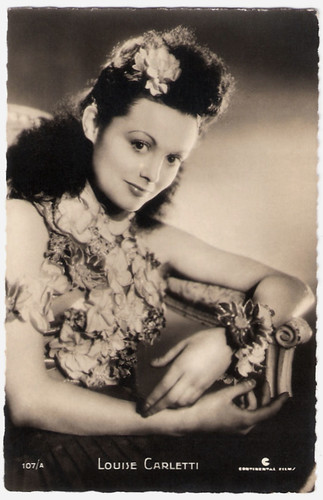
French postcard by Editions Continental, no. 107/A. Photo: Continental Films. Louise Carletti.
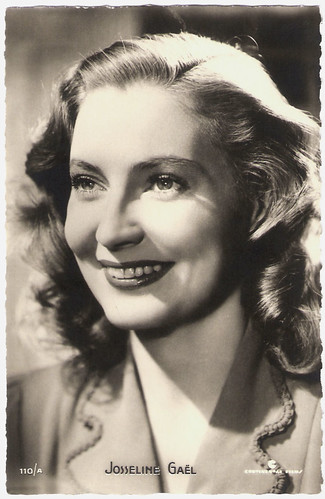
French postcard by Editions Continental, no. 110/A. Photo: Continental Films. Josseline Gael.

French postcard by Editions Continental, no. 114a. Photo: Continental Films. Ginette Leclerc.
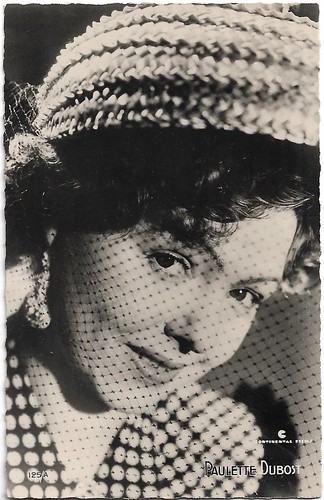
French postcard by Editions Continental, no. 125 A. Photo: Continental Films. Paulette Dubost.
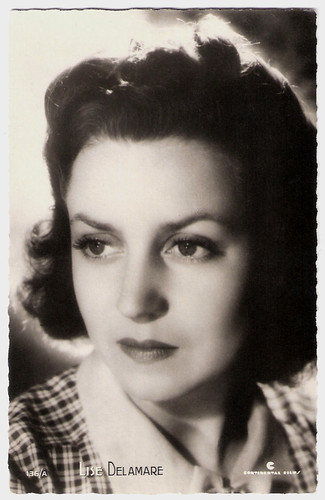
French postcard by Editions Continental, no. 136/A. Photo: Continental Films. Lise Delamare.
Alfred Greven
The director of Continental Film was the German producer Alfred Greven, who was born in 1897 in Elberfeld and died in 1973 in Cologne. After leaving the Gymnasium he volunteered in September 1914 for the German Army. He fought on the Western Front in the infantry and was severely wounded. In 1917, he fought in the Luftstreitkräfte and was awarded the Iron Cross 1st and 2nd class. After the war he started to work in the film business in 1920, joining the Nazi Party in 1931. He had studied in France and was an unconditional admirer of French culture and cinema.
In 1934, he was head of the committee for film production in the Reichsfilmkammer. Some of the films he produced were Der grüne Domino/The Green Domino (Herbert Selpin, 1935) starring Brigitte Helm, its French language version Le Domino Vert/The Green Domino (Henri Decoin, Herbert Selpin, 1935) with Danielle Darrieux, and Der Mann, der Sherlock Holmes war/Sherlock Holmes (Karl Hartl, 1937) with Hans Albers. In 1940, Goebbels appointed him managing director of the newly established Continental Film, his direct superior being Max Winkler. The sometimes high quality of Greven's production was increasingly at odds with Goebbels' film policy so that in May 1942 the head of Continental was summoned to Goebbels' ministry in Berlin: "The minister is dissatisfied with the standard of the Continental films: it is too high for him. Moreover, Greven is to produce German-language films with German actors in Paris."
Following the screening of Christian-Jaque's La Symphonie fantastique/The Fantastic Symphony (1942) with Jean-Louis Barrault, he wrote on 19 May 1942 in his diary that he was furious about Greven's company policy since he was supposedly showing the French how to ban national pride on celluloid instead of serving them with "stupid films". German film policy, Goebbels continued, must be "identical" to that of the United States vis-à-vis North and South America. "We must become the film power on the European continent". To the extent that films are produced in other countries, they should retain "a purely local character". The aim, Goebbels continued, was to prevent the creation of any national film industry "as far as possible" in German-occupied Europe.
Greven countered precisely this claim with his Continental company policy. In 1943, Continental Films produced André Cayatte's Au Bonheur des Dames based on the novel by Émile Zola, an author blacklisted by the Nazis. Greven initiated several other ambitious film adaptations of Guy de Maupassant and Honoré de Balzac. He employed the screenwriter Charles Spaak, who was arrested by the Gestapo, but also quite consciously held his protective hand over the communist, resistance fighter and Jew Jean-Paul Dreyfus, wanted by the occupying forces, the cover name 'Le Chanois'. Jean-Paul Le Chanois was the screenwriter of the Continental film La Main du diable/The Devil's Hand (Maurice Tourneur, 1942). The assistant director Jean Devaivre, in his second existence as a resistance fighter, was also employed by Continental.
With Le Corbeau/The Raven (Henri-Georges Clouzot, 1943), a bleak portrayal of a society under permanent suspicion and pressure to denounce, Continental-Films reached its artistic production peak in 1943, even though this film was immediately banned by the new French government authorities right after the liberation and the two main actors, Pierre Fresnay and Ginette Leclerc, were temporarily banned from working or even sentenced to six months in prison for alleged collaboration with the enemy. Director Clouzot only received a directing assignment again after three years of boycott and was only able to direct his first post-war film in 1947. After the war, Alfred Greven produced films in West Germany including the Catherina Valente vehicle Bonjour Kathrin (Karl Anton, 1957).
The film Laissez-passer/Safe Conduct (Bertrand Tavernier, 2002) depicts life and work at Continental, based on the memoirs of director Jean Devaivre. Greven was portrayed by Christian Berkel.

French postcard by Editions Continental, no. 108/A. Photo: Continental Films. Roger Duchesne.

French postcard by Editions Continental, no. 109/A. Photo: Continental Films. Georges Rollin.
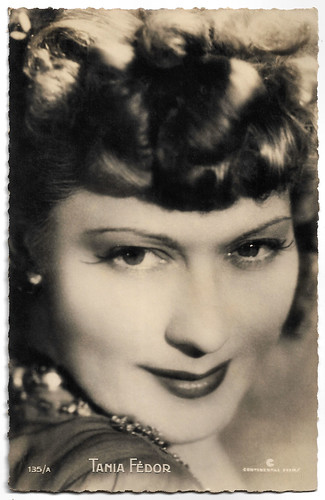
French postcard by Editions Continental, no. 135/A. Photo: Continental Films. Tania Fédor.

French postcard by Film-Foto Verlag, Berlin / Continental Films, Paris, no. 134/A. Photo: Ufa. Zarah Leander.

French postcard by Film-Foto Verlag, Berlin / Continental Films, Paris, no. 146/A. Photo: Ufa. Jenny Jugo.
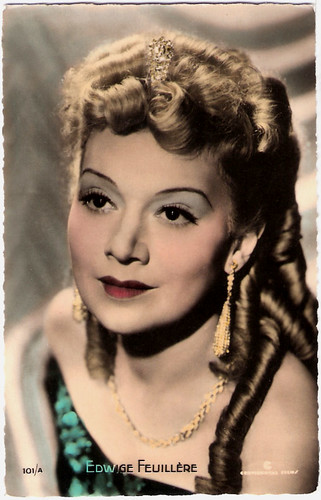
French postcard by Editions Continental, no. 101 A. Photo: Continental Films. Edwige Feuillère.
Sources: Wikipedia (French, German and English) and IMDb.
No comments:
Post a Comment